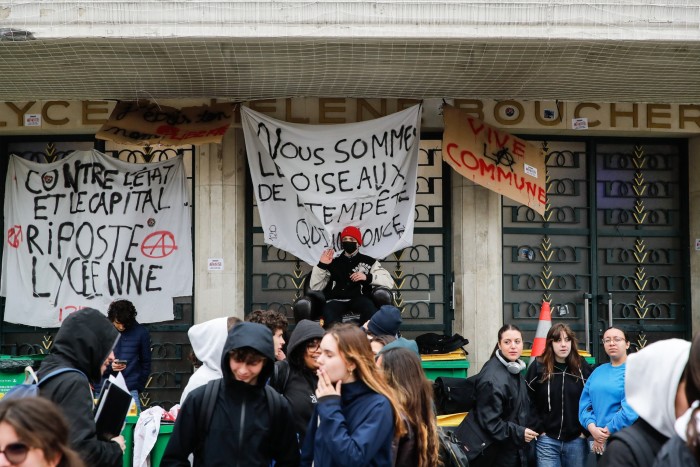Small crowds turned out across France for the 10th nationwide protest organized by trade unions against President Emmanuel Macron’s unpopular plan to raise the retirement age, while strikes disrupted transport and shut down the Eiffel Tower and Louvre museum.
By late afternoon, the CGT trade union estimated that 450,000 people had turned out in Paris compared to 800,000 at the last union-led demonstration on Thursday, with declines also reported in Marseille, Rennes and Toulouse. Police figures put the number of demonstrators across the country at 740,000, compared to more than a million last week.
The low turnout is a boost for Macron’s government, which has rejected attempts at union mediation to ease the crisis and has vowed to insist on completing the reform by mid-April once it is reviewed by the Constitutional Court. The trade unions called another nationwide protest on 6 April.
Some demonstrators may have been deterred from the marches by chaotic scenes at the union-led protest on Thursday, as more radical activists set 900 fires in Paris alone and clashed with police. Some 457 people were arrested, prompting criticism from the European Union’s largest human rights watchdog.
Despite opposition from nearly two-thirds of French people, Macron staked his reform credentials and agenda for a second term on raising the minimum retirement age from 62 to 64. His government eliminated lawmakers this month using Article 49.3 of the constitution to pass it. The bill passed without a vote, sparking a wave of public outrage.
The crowds last Thursday were the largest since the protests began, and spontaneous nighttime protests erupted in many cities and towns, making it difficult for labor unions to control the movement.
Laurelia Frigo, a 23-year-old member of Le Buang Levi, a revolutionary Marxist student group, said young people sought to show their discontent outside of official union-organized rallies, despite police repression.
“The government told us that the millions of people on the streets are not enough, that there is no point,” she said on Place de la Republique, where Tuesday’s rally in Paris began. So we have to radicalize our actions. . . to protest outside of set calendars.”
On Tuesday, some demonstrators set fire to rubbish piling up in Paris, and small groups in Lyon and Bordeaux clashed with police, who responded with tear gas. But the situation in general seemed calmer than it was on Thursday. The Interior Ministry deployed 13,000 police across the country, up from 12,000 last time.

Frigo said it was scary to watch police and protesters clash and make arrests, but she said she was determined to continue. “The government wants to try to intimidate us, but we will not stop.”
Student activists closed nine university campuses in Paris on Tuesday, according to the UNEF union, and at least 10 in cities including Toulouse and Nice. Outside the University of Tolbiac in Paris, students stacked electric scooters and rubbish bins to block off entrances and painted anti-pension reform slogans on walls.
Macron has ruled out withdrawing the reform, arguing that it is necessary to ensure the viability of the pension system as the population ages. The law, which requires constitutional court approval before it can be enacted, would raise the retirement age by two years and require people to work for 43 years to receive a full pension.

The government is concerned that the presence of young people at the demonstrations, along with radical activists the government describes as “extreme left”, increases the risk of injuries or even deaths. In an unrelated protest on Saturday against an agricultural reservoir, two activists were seriously injured in clashes with police and remain in critical condition.
Several human rights groups have sounded the alarm about French police tactics. Dunja Mijatović, the Council of Europe’s commissioner for human rights, said on Friday that the circumstances surrounding the protests had become “alarming” and warned against police using “excessive force” or denying people their right to protest.
Officials at the Elysee Palace reached out to unions to find ways to mitigate the crisis. But the government did not accept their proposal to suspend reform to allow calm to return to the streets.
On Tuesday, Laurent Berger, leader of the moderate CFDT union, proposed creating a “mediation” process led by neutral parties.
“We should take a month or two to ask a handful of people to mediate,” he said on France Inter radio, in what could be a “gesture to restore calm”.
But government spokesman Olivier Ferrand dismissed the idea. “There is no need for mediation when we can speak directly,” he said.

“Lifelong food lover. Avid beeraholic. Zombie fanatic. Passionate travel practitioner.”
